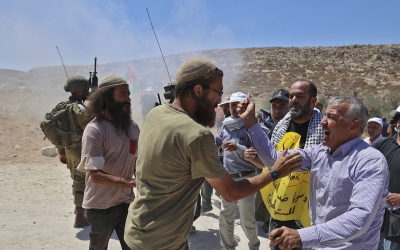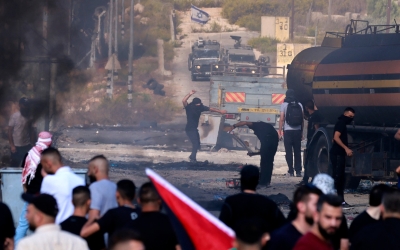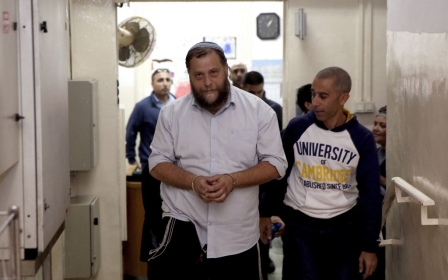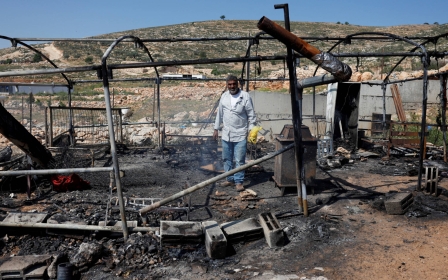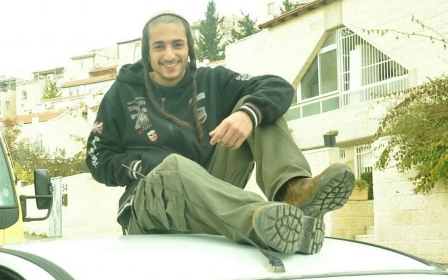Deadly settler attacks sweep the West Bank as Israel's army looks on

Amer Jabr is waiting for his wound to heal so he can commence repairing and cleaning his destroyed home.
Situated in the village of al-Mughayyir, east of Ramallah in the occupied West Bank, his house was the target of a devastating assault by Israeli settlers on Friday.
During the attack, Jabr sustained a gunshot wound to his thigh, while his 14-year-old son was struck by a rubber bullet in the side. Jabr described the ordeal as "one of the most horrific experiences in recent memory".
This incident was part of a series of settler attacks targeting several Palestinian villages in the past week. These assaults followed the announcement by Israeli authorities of the disappearance of a teenage settler, 14-year-old Binyamin Achimair, in villages northeast of Ramallah while herding sheep.
Achimair's body was later found but no one has claimed responsibility for his death.
New MEE newsletter: Jerusalem Dispatch
Sign up to get the latest insights and analysis on Israel-Palestine, alongside Turkey Unpacked and other MEE newsletters
The aftermath of these attacks left four Palestinians dead, dozens wounded, and nearly a hundred homes, vehicles and facilities destroyed. The assaults occurred under the apparent protection of the Israeli army, marking a troubling escalation of violence throughout the West Bank over four days.
In response, the office of Israeli Prime Minister Benjamin Netanyahu denounced the killing of the teenage settler as a heinous crime, though the investigation into the incident was ongoing. Netanyahu vowed to apprehend those responsible, yet notably omitted any mention of the armed settlers' assaults against Palestinian families.
The attacks took place on the same day the US State Department imposed new sanctions on far-right Israeli settlers over their involvement in West Bank violence.
Among those listed is Ben Zion Gopstein, leader of Lehava, a far-right Jewish supremacist group that gained notoriety in Israel for attempting to prevent marriages between Jews and Arabs.
The Treasury Department also designated Mount Hebron Fund and Shlom Asiraich over their role in establishing fundraising campaigns for two US-sanctioned far-right Israelis.
Earlier this year, Washington sanctioned five violent settlers and two illegal outposts in the West Bank.
The sanctions, however, have not deterred new attacks.
Ambulances and firefighters blocked
On his only day off on Friday 19 April, Jabr had just finished lunch with his wife and four children at their home on the northern edge of al-Mughayyir.
Suddenly, a distant sound caught his attention, prompting him to peer out of the windows, only to witness more than 30 settlers charging towards his house and neighbouring properties.
Jabr swiftly secured the windows and doors, but the settlers dispersed across the yard, pelting stones at the house.
"My brothers and I, who live nearby, rushed out to confront them," Jabr recounted.
"That's when they shot me in the thigh. And then, their numbers swelled, and they began hurling incendiary materials at the house," he added.
"I hobbled, wounded, to ensure my wife and children were evacuated, with the help of my brothers."
As the family fled, the Israeli army opened fire, hitting Jabr's son with a rubber bullet.
Despite his own wounds and the bleeding, the army obstructed ambulance crews from reaching them or attending to the numerous wounded in the area. Inevitably, one person succumbed to their wounds.
The obstruction extended to fire crews, impeding their efforts to douse the flames engulfing several homes, resulting in extensive material damage.
"During the attack, we resigned ourselves to the possibility of death," Jabr told MEE. "We never contemplated abandoning our home. Where would we go? This is where we live, where we'll die."
The settlers also targeted the homes of Jabr's four brothers, situated near their childhood home on the village outskirts.
The Israeli authorities constructed a settlement road only hundreds of metres away from his brothers’ homes, depriving Palestinians of a semblance of normal life. These homes are frequent targets of settler violence, but this attack, Jabr noted, was particularly horrific, marked by the use of weapons instead of mere stones.
Approaching the settlement road, built on Palestinian lands, now invites gunfire.
Israeli army complicity
A settler attack on any Palestinian village typically occurs with the accompaniment of the Israeli army, as evidenced by a video clip from the village of Beitin, east of Ramallah. In the footage, settlers are seen burning a Palestinian vehicle with Israeli soldiers nearby.
This observation was highlighted in a report released by Human Rights Watch on Wednesday. The report stated that the Israeli military either participated in or failed to protect Palestinians from violent settler attacks in the West Bank. These attacks have displaced people from 20 communities and entirely uprooted at least seven communities since 7 October.
'It's a fully fledged crime and an exchange of roles between the army, the government, and the settlers'
- Salah Jaber, mayor of Aqraba
Between 7 October and 3 April, the UN recorded more than 700 settler attacks, with soldiers in uniform present in nearly half of these incidents. These attacks have displaced over 1,200 people, including 600 children, from rural herding communities. Additionally, at least 17 Palestinians were killed and 400 wounded, while Palestinians have killed seven settlers in the West Bank since 7 October, according to UN estimates.
Settler attacks on Palestinians reached their highest level in 2023, even before the Hamas-led attacks on 7 October, which claimed about 1,100 lives inside Israel, according to the organisation.
"The military has not assured displaced residents that it will protect their security or allow them to return, forcing them to live in precarious conditions elsewhere," the report added.
Following 7 October, the Israeli military summoned 5,500 settlers who are Israeli army reservists, including some with criminal records of violence against Palestinians, and assigned them to West Bank "regional defence" battalions.
According to Haaretz and Israeli rights groups, the Israeli authorities distributed 7,000 guns to battalion members and others, including "civilian security squads" established in settlements.
Israeli media reports indicated that settlers left leaflets and sent threats on social media to Palestinians after 7 October, such as warnings to "flee to Jordan" or be "exterminated" and that "the day of revenge is coming".
The report added that "Israeli settlers have assaulted, tortured, and committed sexual violence against Palestinians, stolen their belongings and livestock, threatened to kill them if they did not leave permanently, and destroyed their homes and schools under the cover of the ongoing hostilities in Gaza."
Salah Jaber, the mayor of Aqraba, south of Nablus, confirmed these facts to MEE. He witnessed the killing of two Palestinians by settlers' bullets on Monday, with full protection from the Israeli army.
According to Jaber, more than 70 settlers attacked Palestinian homes in the eastern area of the village, prompting residents to confront them. During the confrontation, armed settlers opened fire on the Palestinians, killing Abd al-Rahman Bani Fadel, 30, with a bullet in the neck, and Muhammad Bani Jama’a, 21, with a bullet in the chest. More than 10 others were wounded with various injuries.
The Israeli army immediately detained the two young men while they were still bleeding and prevented ambulance crews from reaching them. The remaining wounded managed to escape to residents' vehicles and then to medical centres.
"When the Israeli soldiers confirmed that the two young men were dead, they informed the Palestinian Civil Liaison … but Israel has so far refused to hand over their bodies, even though they were killed by settlers’ bullets while they were in the yard of their homes," Jaber explained.
"It's a fully fledged crime and an exchange of roles between the army, the government, and the settlers,” he added.
A month ago, according to Jaber, the settlers killed a young man in the same area, which is witnessing confiscation procedures and the demolition of homes under the pretext of not having a permit.
At the same time, the settlers are attacking the residents without any justification. “All of this means that there is a clear plan to displace the Palestinians from all of this area,” he said.
Since the arrival of the new right-wing Israeli government two years ago, this region has been subjected to confiscation decisions and notices to demolish Palestinian homes, with 8,000 dunams confiscated for settlement projects in the last two years alone.
Settlers in these areas employ pastoral settlement as a means to appropriate Palestinian lands, encroaching upon the outskirts of their homes, Jaber added.
Pro-settler government
The surge in settler attacks isn't perceived as random by Palestinians but rather as a deliberate Israeli policy since the current government took office in early 2023.
Amir Daoud, spokesperson for the Apartheid Wall and Settlement Resistance Committee, explained that Israel has established a comprehensive legislative, legal, and logistical framework. This framework not only enables settlers to carry out attacks in the West Bank and Jerusalem, but also empowers them to initiate actions to assert control on the ground.
These attacks serve several key objectives, he told MEE, including the forced displacement of Bedouin communities in the eastern foothills and the collaboration of the Israeli army in enforcing a closure system on Palestinians in the West Bank since October. This closure has prevented farmers from accessing their lands.
'We are confronting a government that sponsors settler terrorism'
- Amir Daoud, Apartheid Wall and Settlement Resistance Committee
Settlers currently bar Palestinians from accessing 410,000 dunams of their land, with 75 percent of these areas concentrated in the eastern foothills and Jordan Valley region.
"The current Israeli government is dominated by settler leaders who are implementing settlement expansion policies," Daoud said. "These policies include legitimising the settlement outposts built haphazardly by settlers and reinstating settlement activities in the northern West Bank by amending the disengagement law through the Knesset."
Following the conflict with Gaza, Israeli Finance Minister Bezalel Smotrich advocated for establishing buffer zones around West Bank settlements. Daoud noted that the committee observed the issuance of three military orders that effectively implemented these buffer zones.
According to the committee's data, settler attacks surged in 2023 compared to 2022. In 2022, 1,180 attacks were recorded, resulting in the deaths of six Palestinians and the uprooting of 9,000 trees. However, in 2023, 2,400 attacks were recorded, resulting in the deaths of 26 Palestinians at the hands of settlers, including 16 since 7 October. Additionally, 18,000 trees were uprooted.
"We are confronting a government that sponsors settler terrorism," Daoud said. "There exists an official institution, represented by the army, the government, and the Knesset, as well as an unofficial institution represented by settler militias. However, it's evident that there is a functional relationship between the two, with the official institution assigning numerous nefarious tasks to settlers."
Imposing a fait accompli
Firas Yaghi, a political analyst and expert on Israeli affairs, argued that the ongoing developments in the West Bank and Jerusalem aim to shape the region's conflict resolution according to Smotrich's proposed plan.
Yaghi anticipates a surge in settlement expansion and provocations by settlers in the West Bank in the near future. He foresees efforts to evict remaining Bedouin communities and the commencement of construction on thousands of housing units across more than 20 new sites on Palestinian lands.
"In my view, the central Israeli policy revolves around imposing a new fait accompli, primarily managed by settlers,” he told MEE.
“The Israeli army is expected to rely on settler militias to confront Palestinians in the West Bank. This escalation might even extend to the Al-Aqsa Mosque, especially following [Israel's national security minister] Ben Gvir's statements regarding potential legislation to facilitate settler prayer there."
Nevertheless, Yaghi believes that opening a new front in the already volatile West Bank, particularly post-7 October, would amplify Israel's burdens and further isolate it internationally.
Yet, he noted that settlers remain undeterred, driven by their agenda for Jerusalem and the West Bank. Yaghi warned that Palestinians in the region may be pushed towards another Intifada due to settlers' efforts to impose a new reality.
This article is available in French on Middle East Eye French edition.
Middle East Eye delivers independent and unrivalled coverage and analysis of the Middle East, North Africa and beyond. To learn more about republishing this content and the associated fees, please fill out this form. More about MEE can be found here.


